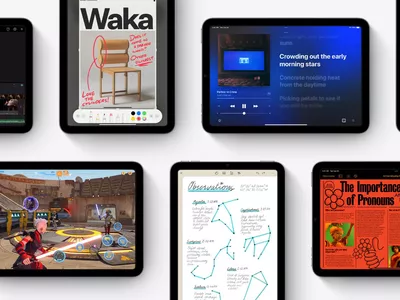
3 Effective Ways to Bypass Activation Lock from Apple iPhone 11 Pro Max

3 Effective Ways to Bypass Activation Lock on Apple iPhone 11 Pro Max
Ever since the launch of the first iPhone, both iPhone and Apple have seen tremendous growth year after year on account of the new features and capabilities Apple continues to add to the iPhone. Apple has placed the Apple iPhone 11 Pro Max as a coveted product, somehow it transcends the feelings of having a smartphone and becomes something special. A lot of it is Apple marketing at work, but the marketers have had great products to work with, too.
Over time, Apple added something called Activation Lock to its devices to deter theft, since, you guessed it, Apple devices are a prime target for thieves. What is Activation Lock? Chances are, if you are reading this article, you are stuck at it, and want to know what to do to bypass Activation Lock on your Apple iPhone 11 Pro Max. We start with a little primer on Activation Lock to give you a better understanding of what it is.
Part 1: Activation Lock Primer
Apple products are costly, and they are prized. When a 5-year-old Android device might be left alone without anyone stealing it, you cannot risk that with an iPhone 6S, even today. Apple has built an Activation Lock in its devices to deter theft and so far, as we know, it has largely succeeded. If your Apple iPhone 11 Pro Max gets stolen, no one else can use it with their Apple ID unless they key in the credentials it was using previously (your credentials) and, even then, Apple has bolstered iCloud Find My Activation Lock to be more restrictive. You may have to key in a lot of information ranging from your device password (if you are also using the same Apple ID on a Mac) to your iOS device passcode too, obviously, your Apple ID password. It is a system that works in favor of Apple users.
Yet, in some cases, users want to get around the Activation Lock for genuine reasons, say, when you buy a used Apple device from someone. They may have forgotten to remove that device from their Apple account and Activation Lock would not let you use it. Or, you are an IT administrator, and you manage devices given out to employees. Some employees did not remove their accounts from their devices, and now those iPhones are riddled with Activation Lock. You can remove it using this step-by-step guide.
Part 2: Bypassing Activation Lock using official methods (Apple iPhone 11 Pro Max)
An Activation Lock is not the end of the world, as Apple might have you believe. Nothing in the world is perfect, except for the world itself. As such, there are ways to bypass Activation Lock on an Apple device that you bought used, and the previous owner forgot to unlock or did so intentionally and is now trying to fleece you for more money to unlock it. Or an employee who just left the job surrendered their iPhone but forgot to erase the Apple iPhone 11 Pro Max device before submitting and consequently, the Apple iPhone 11 Pro Max device is still associated with their Apple ID, and you need to bypass Activation Lock for that Apple iPhone 11 Pro Max to make it useable again. There are a few ways you can go about it.
Method 1. Bypassing Activation Lock Using Apple ID
Disabling Activation Lock on Apple iPhone 11 Pro Max is easy if you have the Apple ID credentials that are associated with the iPhone.

- Step 1: Enter device Recovery Mode and Restore the Apple iPhone 11 Pro Max device to factory settings.
- Step 2: When you set up the Apple iPhone 11 Pro Max device again, you will be required to sign in to the Apple ID associated with the Apple iPhone 11 Pro Max device. Do that and you are golden!
Method 2. Bypassing Activation Lock from iCloud Website
You may also do away with Activation Lock using the Find My iPhone app in iCloud remotely by erasing the Apple iPhone 11 Pro Max device and removing the Apple iPhone 11 Pro Max device from the associated iCloud account.
- Step 1: Visit the iCloud website on a computer at https://icloud.com .
- Step 2: Sign In and go to Find iPhone.
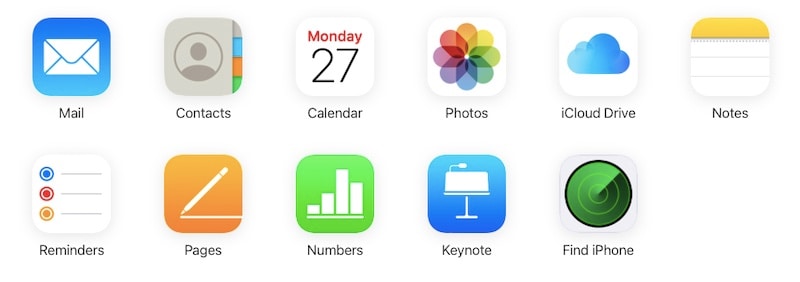
- Step 3: Click All Devices and select the Apple iPhone 11 Pro Max device that was sold to the user.
- Step 4: Click Erase iPhone and if the Apple iPhone 11 Pro Max device is still there after the erase is complete, click Remove From Account.
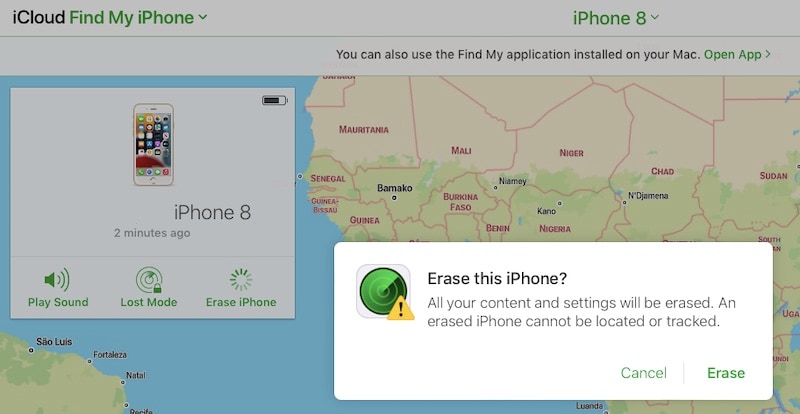
This process requires that the data service be functional on the Apple iPhone 11 Pro Max in question, otherwise, this will not work. When the process is done, restart the Apple iPhone 11 Pro Max and set it up with your Apple ID to remove the lock.
Method 3. Bypassing Activation Lock Using Microsoft Intune
If you are an IT administrator and are using Microsoft services, you may have given employees iPhones. When employees leave or are made to leave, it is possible that the Apple iPhone 11 Pro Max devices they leave behind are still signed in with a password only they know. There is a way Apple provides for Microsoft Intune to disable Activation Lock for corporate devices.
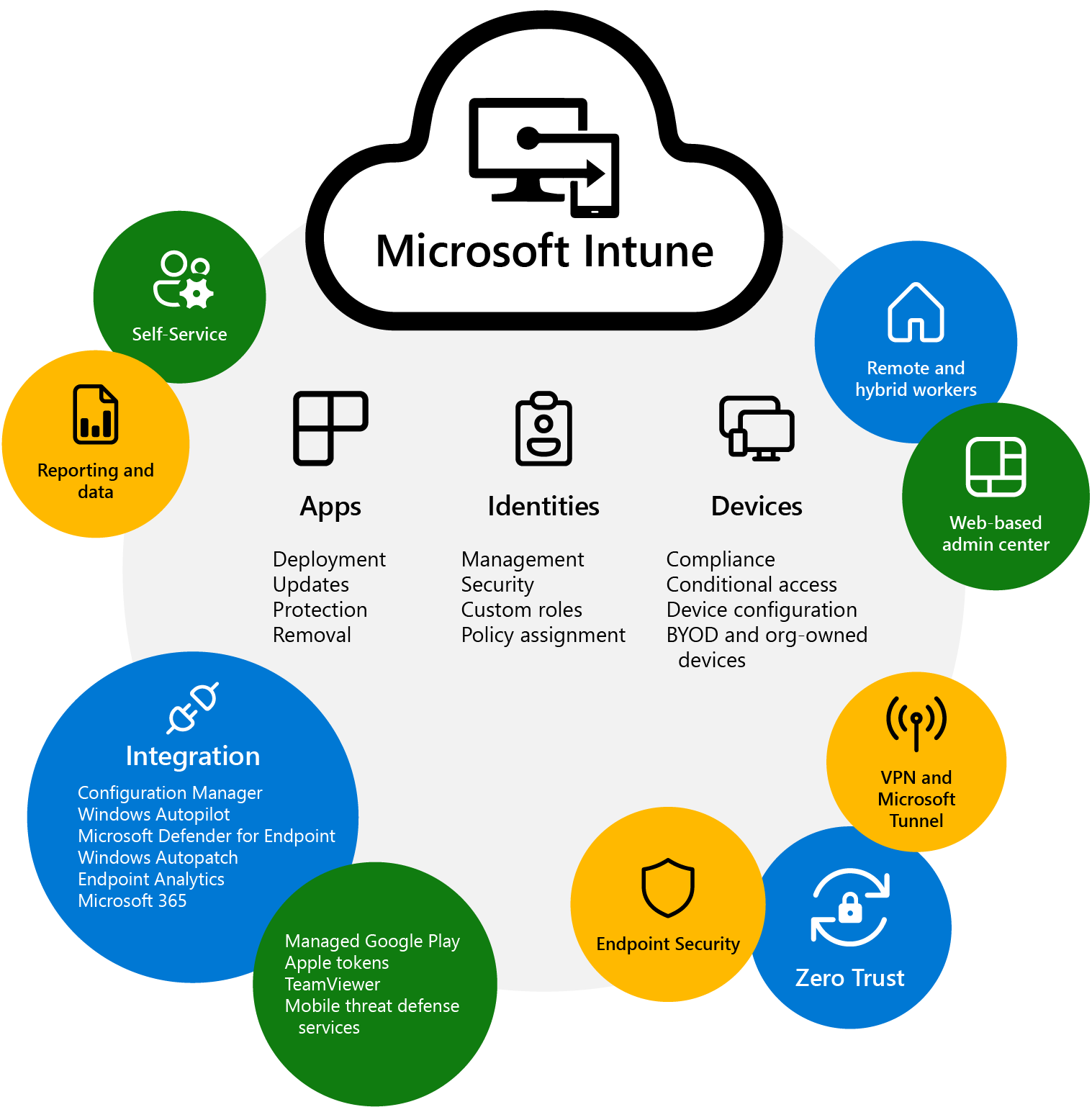
- Step 1: Sign in to the admin center on Microsoft Endpoint Manager.
- Step 2: Select Devices under Intune.
- Step 3: Select All Devices.
- Step 4: Locate the Apple iPhone 11 Pro Max device you want to disable the lock for, and under the Hardware section, copy the Activation Lock Bypass Code given under Conditional Access.
- Step 5: Under the Overview pane of the Apple iPhone 11 Pro Max device, select Wipe.
- Step 6: When the Apple iPhone 11 Pro Max device resets, it prompts for the Apple ID and password. Leave the ID blank and enter the bypass code as a password.
The device will be reset, and employees can set it up again with a new Apple ID.
Bonus Tips: Bypassing Activation Lock with a Professional Tool (iPhone 5S to iPhone X)
For iPhone 5S to iPhone X users who prefer an easier way to remove Activation Lock, Wondershare Dr.Fone - Screen Unlock (iOS) is a suitable option.
Dr.Fone is a set of modules that cater to a myriad of requirements that phone users can have from time to time, and one of them is the need to be able to disable the Activation Lock for Apple devices when the need arises. A need never arises in our wildest dreams, until it does, at the most inopportune time. It has, hasn’t it?
Dr.Fone - Screen Unlock (iOS)
Remove Activation Lock on iPhone Without Hassle.
- Simple, click-through, process.
- Unlock screen passwords from all iPhones and iPad.
- No tech knowledge is required, everybody can handle it.
4,395,219 people have downloaded it
Here is how to use Dr.Fone - Screen Unlock (iOS) to quickly circumvent Activation Lock and get on with setting up your Apple iPhone 11 Pro Max. Who needs to wait to talk with the previous owner or go through all other time-consuming methods when you have Dr.Fone?
Step 1: Get Dr.Fone - Screen Unlock (iOS) .
Step 2: From the list of modules on display, select Screen Unlock.
Step 3: Select iCloud Activation Lock Removal.
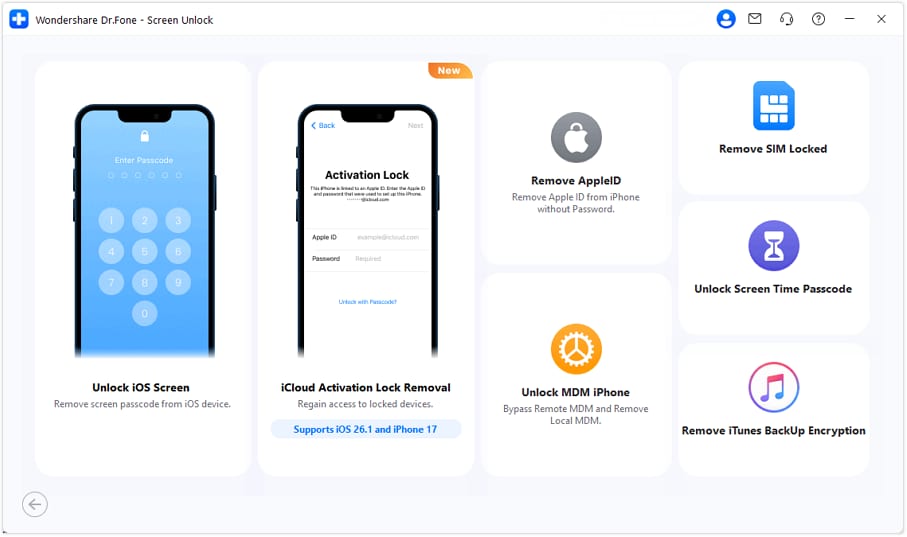
Step 4: Then select Start to initiate unlocking the iOS device’s Activation Lock.
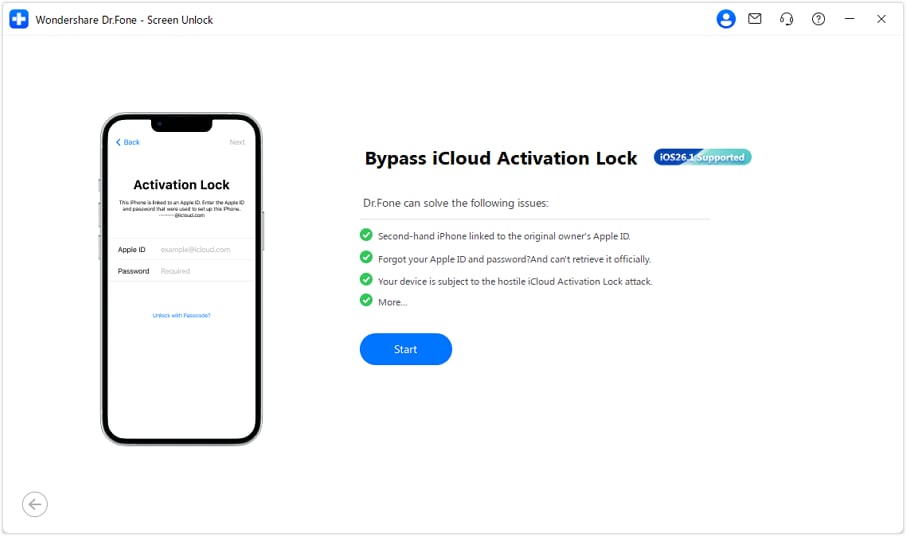
Step 5: Follow the instructions to continue to jailbreak the iPhone.
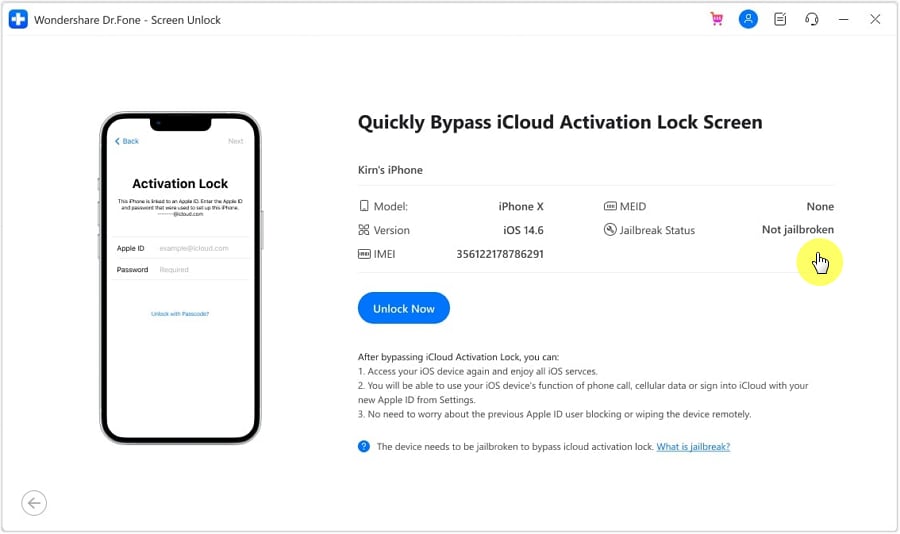
Step 6: After the jailbreak, continue to agree to the terms of use and note the Apple iPhone 11 Pro Max device details displayed are correct.
Step 7: As the final step, click Start Unlock.
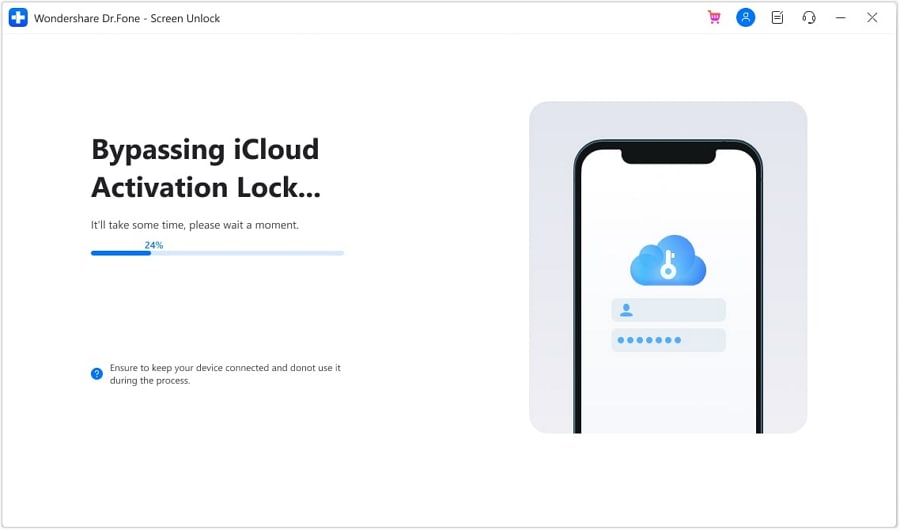
After a while, Dr.Fone - Screen Unlock (iOS) will notify you of a successful bypass. You can now restart the Apple iPhone 11 Pro Max device and use it. This option is restrictive in nature as you will be unable to use the Apple iPhone 11 Pro Max to make calls or access cellular services including iCloud. This option is best for when you want to see/ recover some data from the Apple iPhone 11 Pro Max device that you would otherwise lose.
Conclusion
Removing the Activation Lock is supposed to be as difficult as possible for the wrong people and as easy as possible for the right ones. This means that if you have the Apple ID credentials that were used to enable Activation Lock, you can simply use them to remove Activation Lock and unlock the Apple iPhone 11 Pro Max just as easily. However, things get increasingly difficult from that point on if you do not have Apple ID credentials. You can use iCloud to erase the Apple iPhone 11 Pro Max device and remove the Apple iPhone 11 Pro Max device from the Apple ID account it is connected to, remotely. If you are an IT administrator deploying Microsoft services, you can use Microsoft Intune to get around the Activation Lock easily.
If you are an iPhone 5 to iPhone X user, Dr.Fone - Screen Unlock (iOS) is available as an option to bypass Activation Lock on the iPhone. It should be noted that this process will cause the Apple iPhone 11 Pro Max device to be “rooted”, meaning that data services and iCloud will not function and phone calls cannot be made from the Apple iPhone 11 Pro Max device.
What You Want To Know About Two-Factor Authentication for iCloud On your Apple iPhone 11 Pro Max
Hackers have stolen millions of iCloud credentials in the past and demanded Apple pay for a ransom. This is starting to become a thing of the past as Apple implemented two-factor authentication to secure your Apple ID.
However, it’s not always perfect, as sometimes you need to get past two-factor authentication on your iCloud for various reasons. That’s why this article will teach you how to set it up and bypass two-factor authentication on iCloud yourself if you need to. Read further to learn more.

Part 1: What Is Two-Factor Authentication for iCloud?
Not to be confused with Apple’s two-step authentication, the new and more secure two-factor authentication on iCloud introduces push notifications on your iOS device to keep your data safe. With Apple’s two unique ways to prove your identity, hackers will find it harder to access your personal and financial data.
Switching to two-factor authentication rather than two-step is becoming more common nowadays as security measures are more advanced. You can always switch your security measure at any point, but remember that two-factor authentication is now an essential way to keep your data safe.

Part 2: What Are the Benefits of Two-Factor Authentication?
Setting up two-factor authentication is a secure way to protect your device against unauthorized access. Adding another layer to your username and password highly reduces the chances of hackers obtaining your account.
Here are some of the benefits of activating two-factor authentication on your device.
- Improved security - A second form of identification aside from your password reduces the chance for someone to gain access to your information.
- Interconnectivity to mobile engagement - Two-factor authentication from businesses provides users with a stronger login system to ensure their information is safe in the digital world.
- Reduces Fraud - Due to the rise of identity theft in recent years, businesses risk losing trust, brand equity, and credibility. A secure authentication system adds a layer of protection to keep you secure.
Part 3: How To Set up Two-factor Authentication for iCloud?
If you haven’t set up two-factor authentication yet on your iCloud, here are the steps to activate it right now.
Step 1: On your Apple iPhone 11 Pro Max/iPad, go to Settings and tap your Apple ID profile at the top.

Step 2: Tap Password & Security and turn On Two-Factor Authentication.
Step 3: Enter a phone number to receive the two-factor code via an SMS or a phone call.
Step 4: Enter the 6-digit verification code received on your device and wait for the process the finish.
Note
You can turn off two-factor authentication within two weeks of enrollment. After that, it’s permanent.
Part 4: How To Turn Off Two-Factor Authentication on Your Apple iPhone 11 Pro Max?
As previously stated, once two-factor authentication is active on iCloud, you only have a two-week window to deactivate it again.
To get past two-factor authentication on iCloud, Go to Settings > your name > Password & Security. Tap Two-Factor Authentication and turn it Off again.
Meanwhile, here are the steps to learn how to bypass 2-step verification on iCloud on the web.
Step 1: Go to the Apple ID sign-in page and log in with your Apple ID.
Step 2: Click Sign-In and Security > Account Security.

Step 3: Click Turn Off Two-Step Verification. Answer a security question you’ve set up previously to finish the process.
Part 5: Is It Possible to Bypass Two-Factor Authentication for iCloud?
If you’re wondering how to bypass two-factor authentication on iCloud, the answer is no, you can’t. However, if you don’t have access to your trusted device, you can have a code sent to your trusted phone number via an SMS or an automated phone call to prove to Apple that you own the iCloud account.
If this is impossible, you should request account recovery to regain access to your account.
The easiest way to prevent this issue is by adding another phone number to your Apple ID so you’ll always have a backup. Here’s how.
Step 1: On your Apple iPhone 11 Pro Max, go to Settings and tap on your Apple ID > Password & Security.
Step 2: Tap Edit and choose to Add a Trusted Phone Number. You’ll have to enter your device’s passcode to continue.

Step 3: Enter your new phone number. Select a way to receive a verification code via sms or phone call and tap Send.
Step 4: Enter the verification code and wait for the process to finish.
Bonus Tips: Forgot Your iCloud Password? Here’s What To Do
Using special programs like Dr.Fone can help you recover your iOS device if you forget your iCloud password.
Dr.Fone’s key features are:
- Removes all types of iPhone locks such as Apple ID password, Face ID, Touch ID, and more.
- Bypass iCloud activation lock.
- Unlock your Apple iPhone 11 Pro Max without carrier restrictions.
- Remove MDM profile / bypass MDM lock without data loss.
Here’s how to use Dr.Fone if you forget your iCloud password.
Step 1: Download and install Dr.Fone .

Step 2: Click Screen Unlock on the main program window. On the next screen, click Bypass Activate Lock.
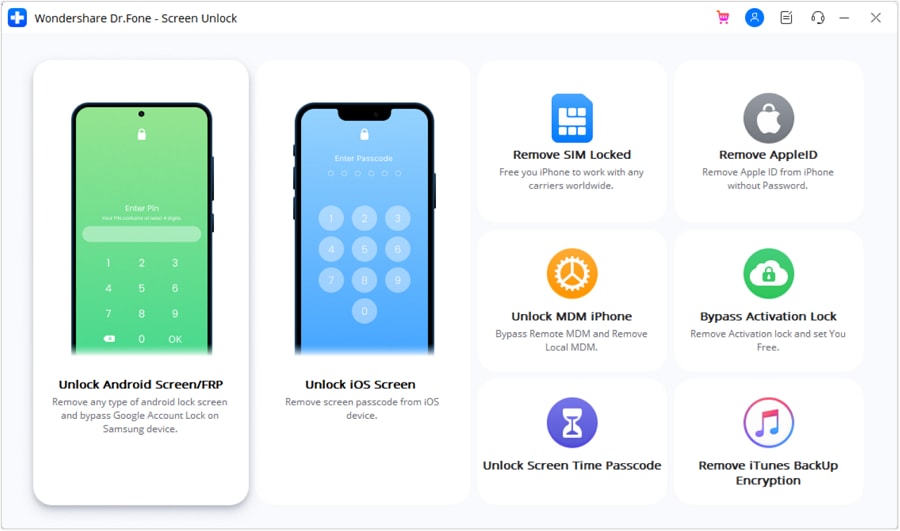
Step 3: Click Start to initiate the process of unlocking your Apple iPhone 11 Pro Max without an iCloud password.

Note
Your iPhone will need to be jailbroken before bypassing it using Dr.Fone.
After step 3, there are two possible outcomes for GSM and CDMA iPhone devices.
- If you own a GSM device, the unlocking will do no harm to your iOS device, and you can enjoy your Apple iPhone 11 Pro Max as usual.
- If the Apple iPhone 11 Pro Max is CDMA, you won’t be able to use the Apple iPhone 11 Pro Max device for phone calls, cellular data, and iCloud of your new Apple ID.
Conclusion
Turning on your iCloud’s two-factor authentication is necessary for today’s high-tech society. It ensures your information is always secure and minimizes the risk of getting hacked or having your account stolen. Once two-factor is active on your Apple ID, Apple provides you with a two-week window to deactivate it if you change your mind.
Meanwhile, if you forgot your iCloud and have a hard time recovering your account, you can try using dedicated programs like Dr.Fone to unlock your iOS device in a few steps.
Easy Fixes: How To Recover Forgotten iCloud Password On your Apple iPhone 11 Pro Max
In the fast-paced digital era, it’s not uncommon to face the common dilemma: “I forgot my iCloud password.” The significance of accessing your iCloud account, which is packed with precious data and services, cannot be overstated. In this guide, you’ll learn how to find your forgotten password of iCloud, offering you a lifeline back into your digital world.
Get ready to navigate simple steps in recovering your iCloud access, ensuring you effortlessly regain control. Say goodbye to the worry of “forgotten iCloud password.” This article features easy-to-follow solutions to make the journey back to your iCloud account both straightforward and stress-free.
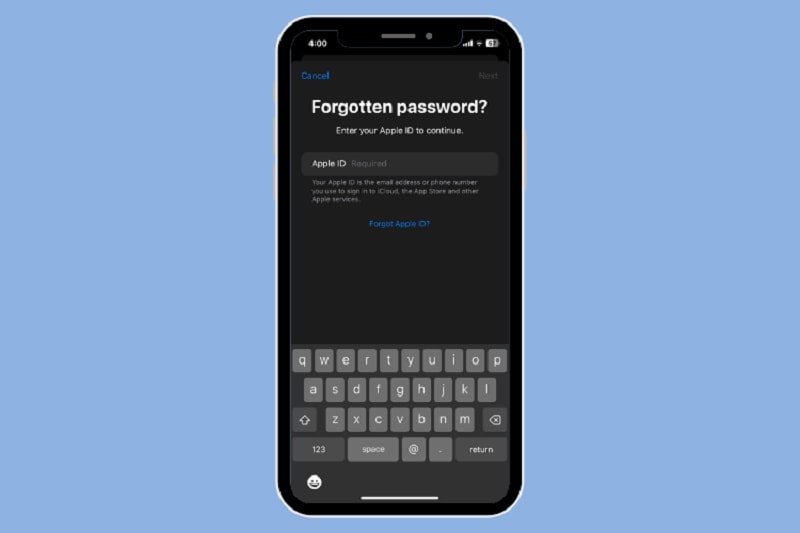
Part I. How To Find Your iCloud Password
In the digital world dominated by Apple services, your iCloud password is the golden key, granting access to a treasure trove of data and seamless connectivity. A forgotten iCloud password could greatly impact your daily life as an Apple user—a potential roadblock to photos, documents, and essential services.
How To Find Your iCloud Password
Thankfully, finding your iCloud password is a straightforward process. Check out the steps below:
- Step 1: Begin by opening your device’s Settings.
- Step 2: Scroll down and tap on your name, then select Sign-In & Security. There, you’ll find the Change Password option.
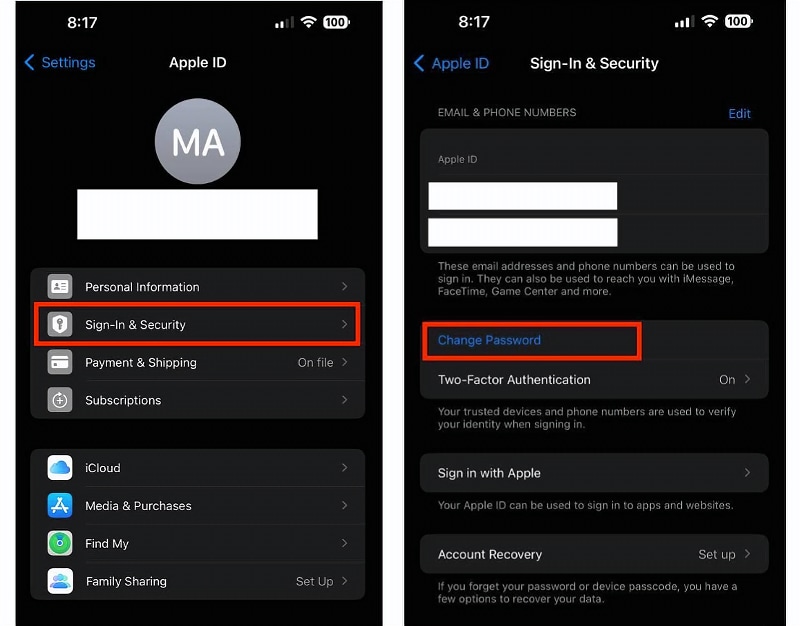
- Step 3: You may be asked to Enter Your Apple iPhone 11 Pro Max Passcode to proceed.
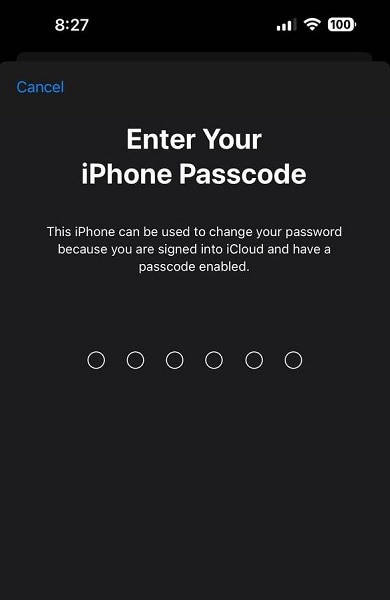
- Step 3: If you can recall your current password, you can proceed to update it. If not, you may use Chrome Passwords or Apple’s iCloud Keychain feature, where you may have saved your iCloud password.
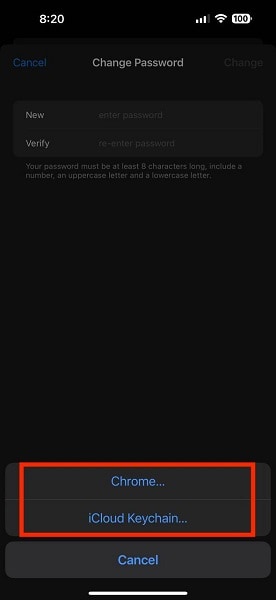
The Frustration of Forgetfulness
The frustration of don’t remember iCloud password is all too relatable. It’s a moment of panic when you realize your access to Apple’s ecosystem is temporarily halted. But fear not, as in the upcoming section, this article will guide you through the simple and effective steps to recover the password, ensuring a swift return to your iCloud account.
Part II. Easy Ways To Recover Forgotten iCloud Password
Recovering a forgotten iCloud password may seem hard, but armed with these easy-to-follow methods, you can reclaim access to your Apple universe.
Official Channels
These are the methods to reset the forgotten password through Apple’s official channels:
Apple ID Account Recovery Process
Apple provides a user-friendly account recovery process.
- Step 1: Visit the official Apple iCloud account page. Click Sign In then choose Forgot password?.
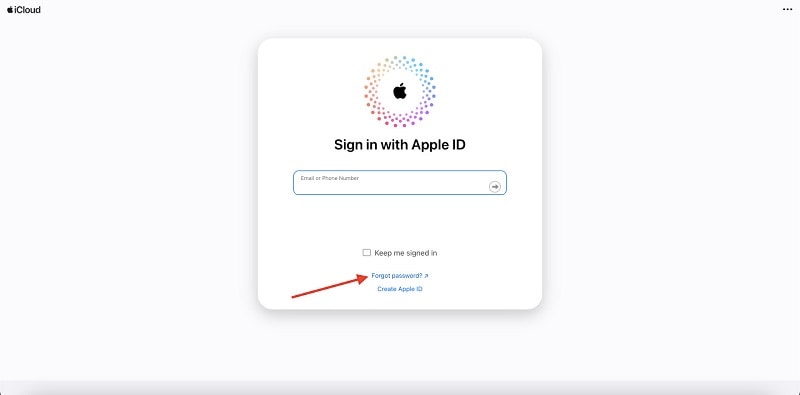
- Step 2: You will then be redirected to a new window to recover access to your iCloud account. Enter your Email or phone number and Type the characters in the image. Click Continue to proceed.
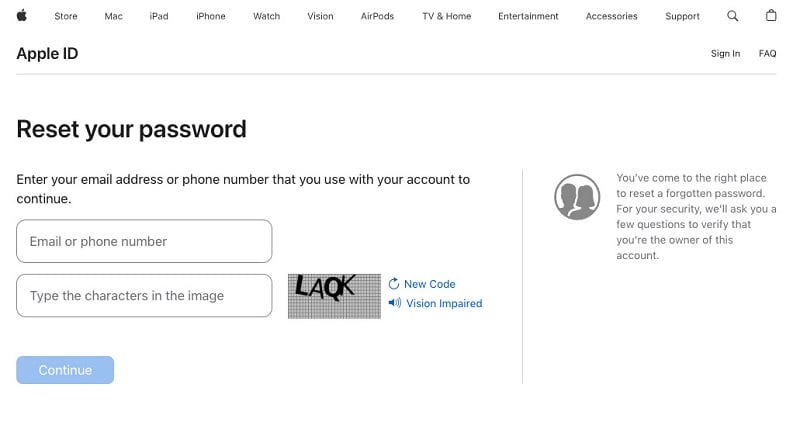
- Step 3: You will then be asked to Confirm your phone number so that Apple can verify that the account belongs to you.
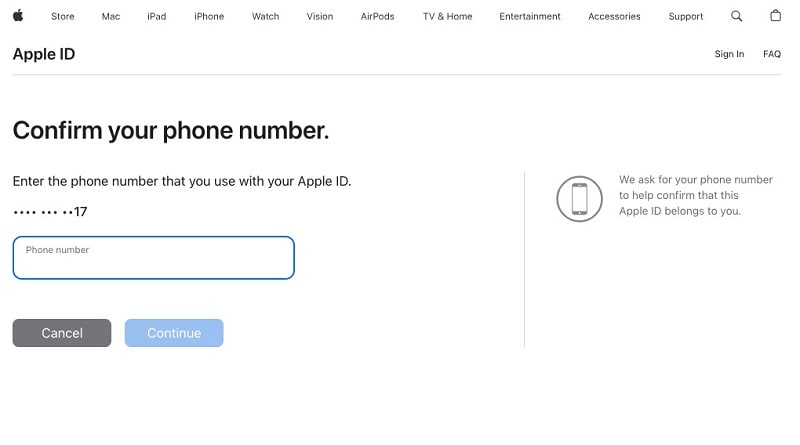
- Step 4: You will be presented with three options. Choose the best option that works for you, then follow the on-screen instructions for the option you’ve chosen.
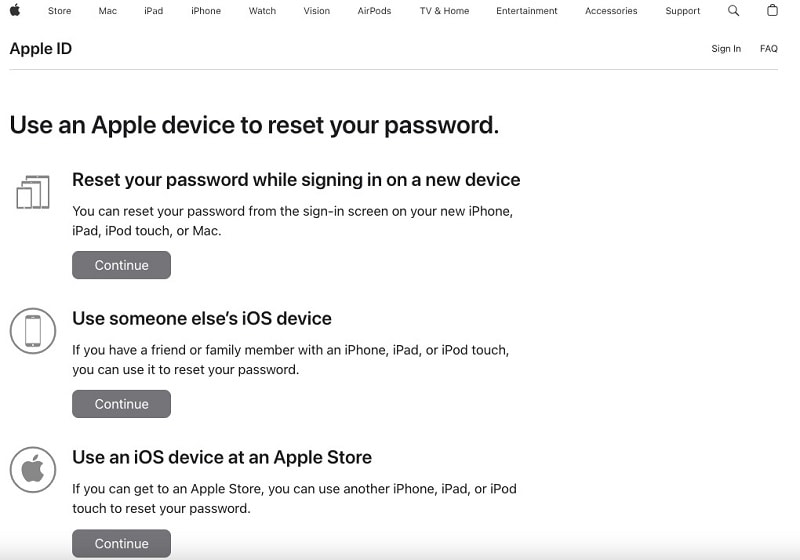
Two-Factor Authentication Recovery Steps
Recovery is equally straightforward for those who have embraced the added security of two-factor authentication. Access a trusted device or request account recovery through another trusted device. Follow the prompts, confirm your identity, and reset your iCloud password hassle-free.
B. Alternative Approaches
Check out these alternative processes if the above options don’t work for you:
Security Questions and Rescue Email
Don’t overlook the power of security questions and rescue email to recover forgotten iCloud passwords. Access the Apple ID account sign-in page, select Forgot Password? and choose the option to answer security questions or receive an email. Providing the correct answers or accessing the rescue email will pave the way to resetting your iCloud password.
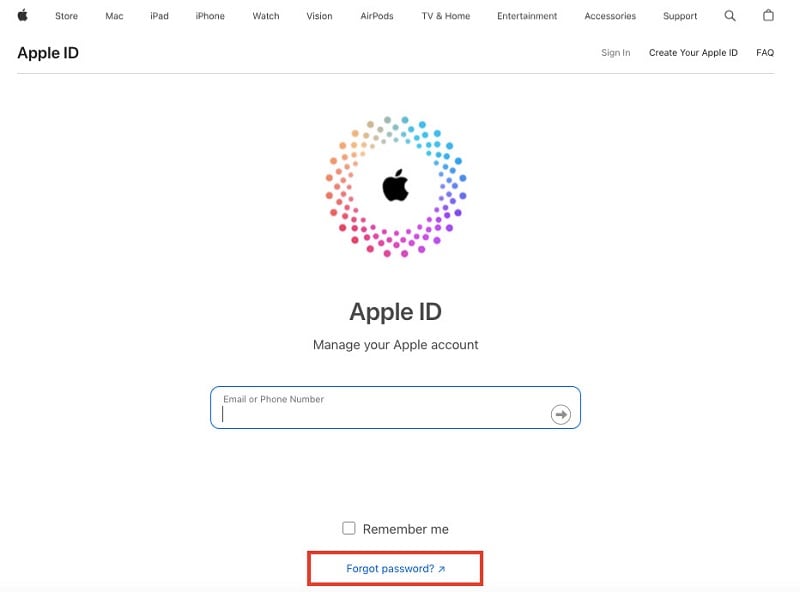
Contacting Apple Support for Assistance
Sometimes, a helping hand is the best solution. If the DIY approaches seem daunting, reaching out to Apple Support can provide personalized assistance. Connect with Apple’s knowledgeable support team via phone or online chat, explain your situation, and let them guide you through the steps to regain control of your iCloud account.
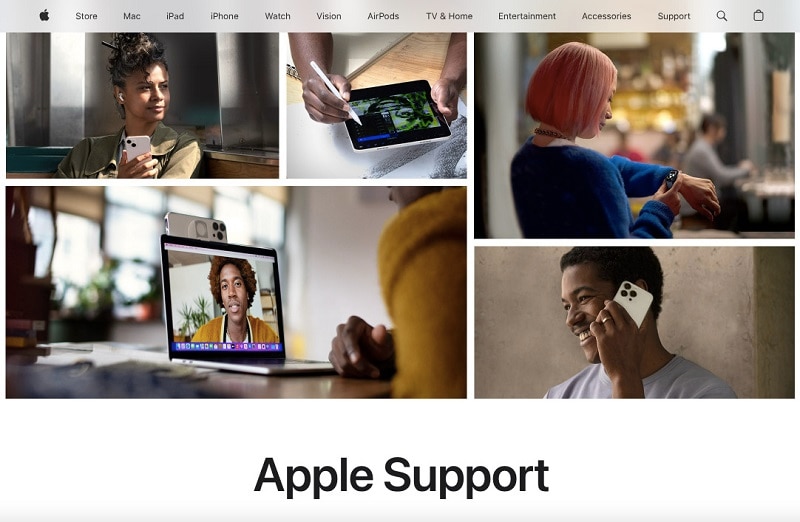
Whether you choose Apple’s official channels or alternative approaches, the goal remains the same – a seamless recovery experience that ensures you’re back in command of your digital kingdom. Stay tuned as this article introduces a reliable advanced solution for a forgotten iCloud password.
Part III. Advanced Solution for Forgotten iCloud Password
What if the above methods to recover your forgotten iCloud password did not work, and you find yourself locked out of your Apple iPhone 11 Pro Max? Don’t worry; this section offers an advanced solution – Wondershare Dr.Fone – Screen Unlock (iOS). It’s a powerful tool designed to effortlessly unlock your Apple iPhone 11 Pro Max and rescue you from the frustration of being locked out of your device.
Experience the unparalleled capability of Dr.Fone – Screen Unlock (iOS) to unlock your Apple iPhone 11 Pro Max easily. No more daunting “I forgot iCloud password” moments. Dr.Fone empowers you to regain control swiftly.

Key Features and Benefits
Check out these amazing features of Dr.Fone – Screen Unlock:
- **Simple and User-Friendly.**Intuitive interface ensuring a hassle-free user experience. No technical expertise is required – just a few clicks to unlock your Apple iPhone 11 Pro Max.
- Works seamlessly across various iPhone models and iOS versions. Your reliable companion for iCloud password recovery, regardless of the Apple iPhone 11 Pro Max device.
- **Efficient iCloud Unlock.**Swiftly unlock your device without the need for extensive technical knowledge. Say goodbye to prolonged wait times; Dr.Fone – Screen Unlock ensures a quick and efficient solution.
- **Safe and Secure.**Your data integrity is a priority – Dr.Fone guarantees a secure unlocking process. It protects your privacy while providing a seamless iCloud password recovery experience.
How To Use Dr.Fone – Screen Unlock (iOS)
Dr.Fone – Screen Unlock (iOS) offers a comprehensive solution for unlocking iOS devices without a passcode. The following instructions demonstrate how to unlock an iPhone without a password using this screen unlocking tool:
Step 1: Install Wondershare Dr.Fone on your computer, then open the iOS tool in a new window by going to Toolbox > Screen Unlock > iOS.
Step 2: To unlock your iOS device’s screen, select the Unlock iOS Screen button on the next screen. Press Start on the next screen to start unlocking the iOS device.
_Note:_ Before proceeding, ensure your device’s battery is fully charged.
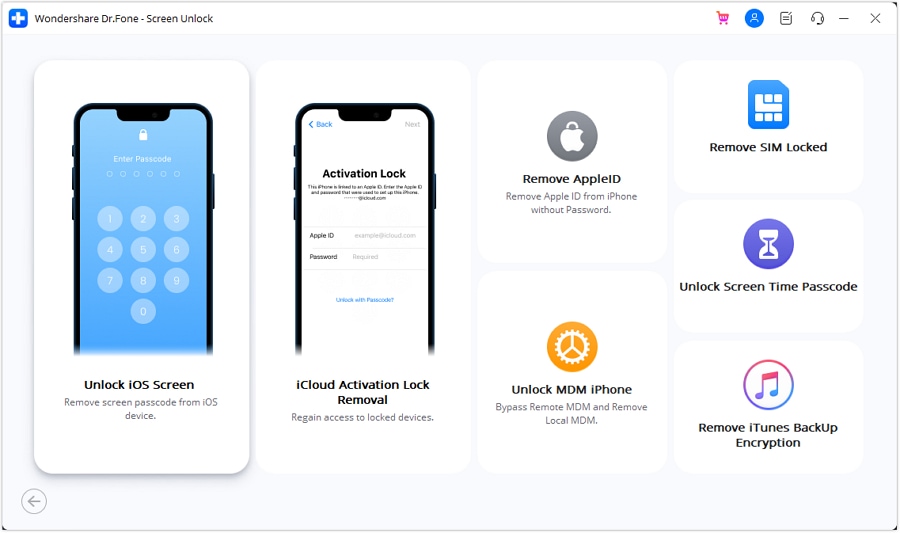
- Step 3: Next is to enter your iOS device into Recovery Mode. Follow the on-screen prompts to switch your iOS device into the mode for your specific model. If the Recovery Mode fails on your end, you may try DFU mode instead. Just click the Try DFU Mode button at the bottom of the page to proceed.
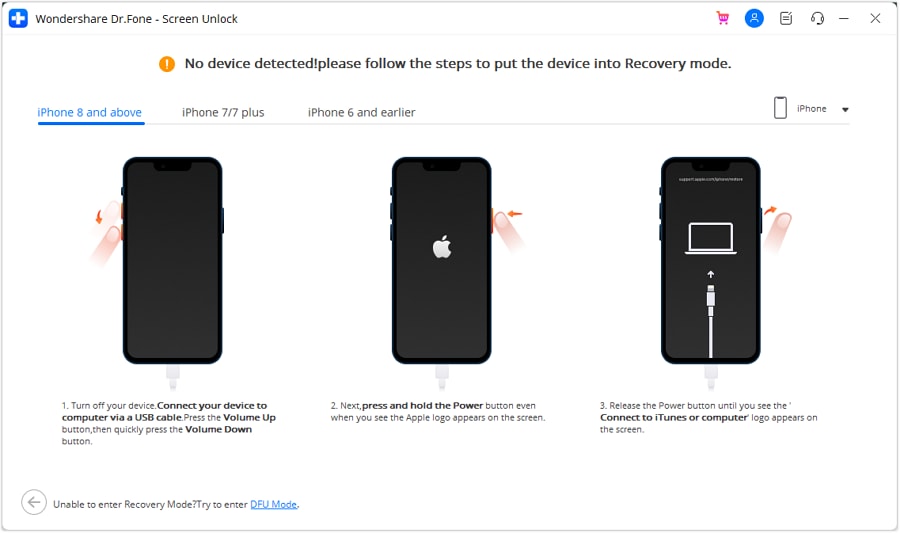
- Step 4: Once the user has successfully entered Recovery Mode on their iDevice, the platform will automatically detect the Device Model and present it in the appropriate section. Adjust the model and choose the System Version as needed to meet your needs. When you’re ready to unlock your device’s screen, click Start.
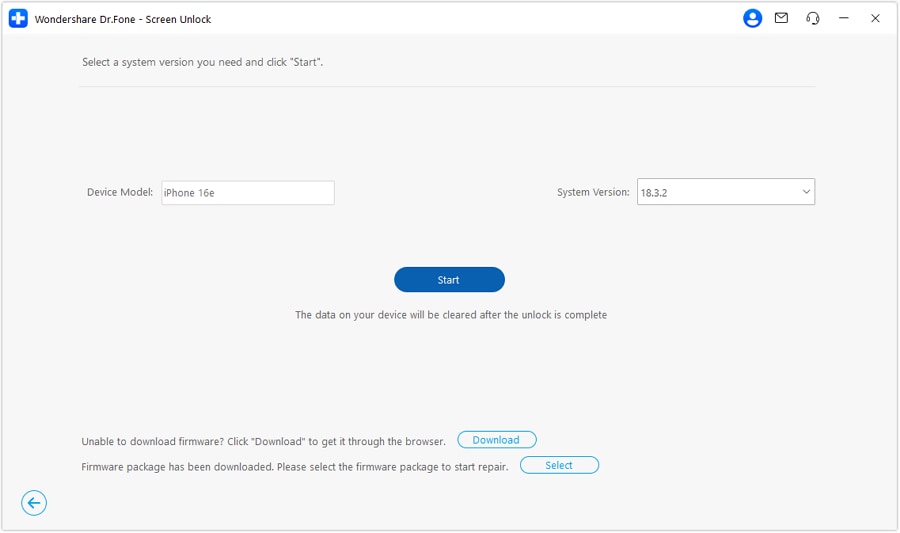
- Step 5: You may see how far along the iOS firmware download is on the following screen. If you want to stop the procedure, click the Stop button. When the platform’s iOS firmware download link takes too long, you can copy the link manually by hitting the Copy button.
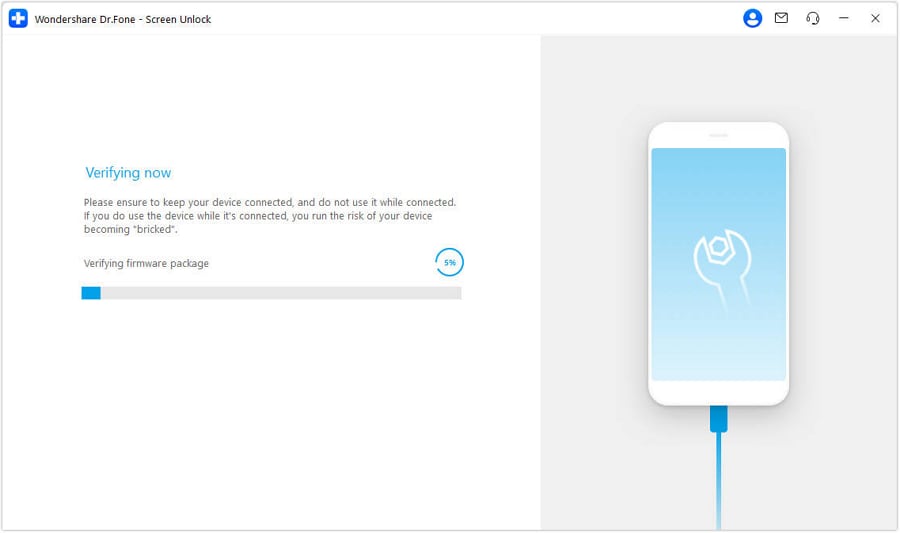
- Step 6: The iOS firmware is checked and shown on the following screen after a successful download. To proceed with unlocking, click the Unlock Now button again.
- Step 7: A confirmation window will then pop up and ask you to confirm the process. To proceed, type in the appropriate code and then hit Unlock. The iOS device’s progress meter as it unlocks is displayed on the following screen.
_Note:_ Your device needs to stay connected; failing to do so will cause it to brick.
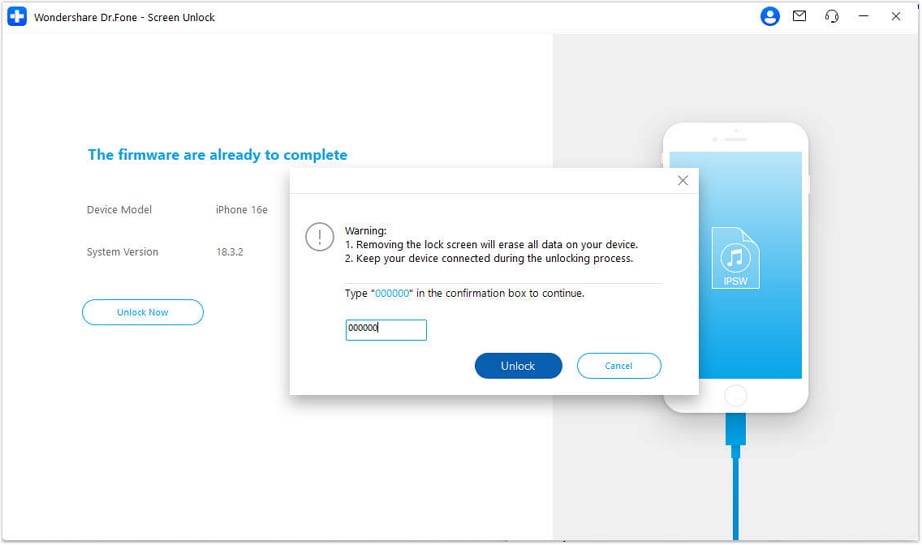
- Step 8: When done, click the Done button to finish unlocking the iDevice. Click Try Again to begin the procedure once more if you still face a locked iDevice.
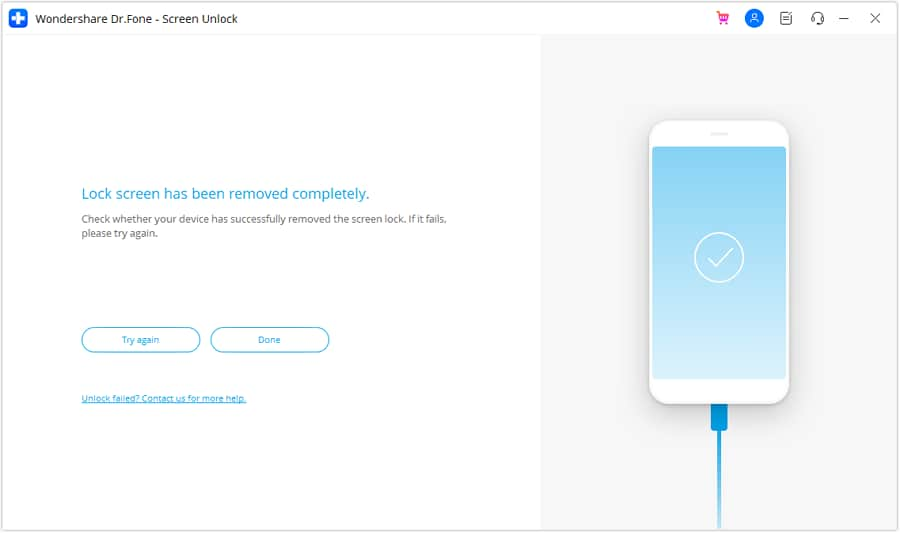
When all else fails, and you find yourself locked out due to a forgotten iCloud password, Dr.Fone – Screen Unlock (iOS) emerges as the advanced solution you need. Unlock your Apple iPhone 11 Pro Max effortlessly, ensuring a smooth, stress-free journey back into your digital world. Don’t let iCloud issues hold you back – trust Dr.Fone to be your key to access.
Conclusion
In this article, you navigated the twists and turns of forgotten iCloud passwords, providing you with simple methods and advanced solutions. Whether through official channels, alternative approaches, or the powerful Dr.Fone – Screen Unlock (iOS), this article ensured a comprehensive guide for every user.
Now, as you try reclaiming your iCloud access, remember the ease and efficiency Dr.Fone brings. Say goodbye to the worry of locked iPhones and ‘forgotten iCloud password’ issues. Trust Dr.Fone to be your digital savior, making the whole process smooth and stress-free. Your access, your control – it’s all at your fingertips.
Also read:
- [New] Crafting Instagram Stories Polls - Your Complete Playbook
- [New] In 2024, The Path to Artistic Expression – Discover Free Tools for Voice Modification
- [Updated] Cloud Service Pricing A Comparative Look
- [Updated] YouTube Followers Surge Top Tips for Channel Expansion
- Capturing Chaos in High Definition - The Polaroid XS Review for 2024
- Download Free Microsoft AVI Video Encoder Compatible with Windows 11
- Easy Tutorial for Activating iCloud on Apple iPhone 12 Pro Safe and Legal
- In 2024, 3 Effective Ways to Bypass Activation Lock from Apple iPhone 11 Pro
- In 2024, 3 Effective Ways to Bypass Activation Lock from iPhone 6
- In 2024, 3 Effective Ways to Unlock iCloud Account Without Password On iPhone SE (2020)
- In 2024, Best Ways to Bypass iCloud Activation Lock from iPhone 6/iPad/iPod
- In 2024, How To Remove iCloud From iPhone 11 Pro Max Smoothly
- In-Depth Comparison Can InShot Outshine Competitors for 2024
- Integrated Sound & Vision Workspace
- New Guide How To Check iCloud Activation Lock Status From Your Apple iPhone 6s Plus
- New Guide How To Check iCloud Activation Lock Status On Your iPhone 6 Plus
- Unlocking Money Potential A Beginner's Guide on Periscope
- Title: 3 Effective Ways to Bypass Activation Lock from Apple iPhone 11 Pro Max
- Author: Lydia
- Created at : 2025-01-01 21:03:59
- Updated at : 2025-01-05 17:24:29
- Link: https://activate-lock.techidaily.com/3-effective-ways-to-bypass-activation-lock-from-apple-iphone-11-pro-max-by-drfone-ios/
- License: This work is licensed under CC BY-NC-SA 4.0.